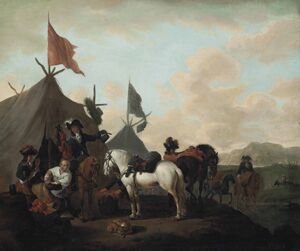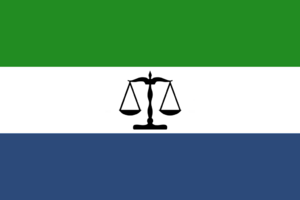Free Republic of Aciria
Free Republic of Aciria Libera Repubblica di Aciria | |||||||
|---|---|---|---|---|---|---|---|
|
Flag | |||||||
Motto: Uniti e Liberi ("United and Free") | |||||||
| Capital and largest city | Trossera | ||||||
| Official languages | None on a judiciary level | ||||||
| Religion | Catholicism | ||||||
| Demonym(s) | Aciriani | ||||||
| Government | Unitary semi-presidential republic | ||||||
| Oratore Supremo | |||||||
• 1625 | Silvano de Albairate (first) | ||||||
• 1783 | Uberto Rigamonti (last) | ||||||
| Oratore Minore | |||||||
• 1625 | Vupu Ponelegri (first) | ||||||
• 1783 | Falio Guerrara (last) | ||||||
| Legislature | People's Senate | ||||||
| Chamber of the Republic | |||||||
| Citizen's Assembly | |||||||
| Establishment | |||||||
• Declaration of the Free Republic | 1625 | ||||||
| Currency | Republican Fiore | ||||||
| |||||||
The Free Republic of Aciria (Acirian: Libera Repubblica di Aciria), sometimes referred to as the Acirian Republic, was an independent Republic in northwestern Sarpedon, existing from 1625 until 1783 when it was reformed into the Grand Empire of Aciria following the seizure of power by Giovanni I.
The Free Republic was established in 1625 following the Declaration of the Free Republic which created the first independent Acirian state, gaining its independence from the Imperium of Caphiria during the tumultuous period following the Great Schism of 1615. The Free Republic attempted to mend the social and cultural differences by granting all parties equal representation in the People's Senate, but the same social and cultural differences resulted in the Senate unable to agree on anything, regularly resulting in one of the senatorial parties walking out in protest and the replacement of the Oratore Supremo. The senate's inability to provide for the nation resulted in widespread unrest and regular revolts due to famine, which the Free Republican Army often struggled to pacify. The lack of central government meant the people returned to looking to their local community, strengthening the regional identities of Aciria further.
While widely seen as a failed state due to the stagnant cultural, economical and scientific development, the Free Republic is seen as an important part of Acirian history due to it being the first truly free Acirian nation. Some Republican tradition, such as the People's Senate, was repurposed as part of the Grand Assembly following the reformation period into the Grand Empire of Aciria.
History
Establishment
The Great Schism of 1615 meant the progressive decline of authority over the western provinces, which sought to gain independence during the period. Silvano de Albairate, a Trossera bureaucrat had been inspired by the recent independence movements of modern Pelaxia and Cartadania, which lead to him beginning contact with various representative figures for commoners, the clergy and nobility across the country. He invited these representatives to his villa in Trossera, where he presented the initial draft of the Declaration of the Free Republic; a state where the social or cultural background didn't matter, with the clergy, commoners and nobility being granted equal representation in the People's Senate, representing the people of Aciria - the term de Albairate had created to describe the potential new Free Republic.
While the representatives of the commoners and clergy alike quickly agreed to it, de Albairate found opposition among the nobility. De Albairate eventually granted the nobility more seats in the People's Senate, giving them a slight numerical advantage to the clergy and commoners, but de Albairate explained to the representatives that the clergy and commoners together make up the majority of the senate would they work together. A clergyman present at the villa wrote that the debates regarding the declaration lasted two weeks, but finally on 2 July 1625, de Albairate headed to the market square of Trossera where he declared the formation of the Free Republic of Aciria, formally seceding from the Imperium of Caphiria. The representatives from their respective regions spread the word of the Free Republic and Acirian independence on their return, with most of both urban and rural population alike knowing of the new-found independence.
Formation of the Free Republican Army
One of the promises de Albairate made at the market square following the declaration of the Free Republic was the stabilization of the country. In order to achieve this, de Albairate proposed the formation of the Free Republican Army to the Senate. The proposal was agreed on near unanimously, with Aurelio Biancardi being named as the first Marshal of Aciria with the task of forming the army. Biancardi looked to the veterans of the legions that had been assigned to Aciria prior to its independence, employing many of those veterans as officers, whether or not they had officer backgrounds in the legion. These veterans were complimented by the masses of commoners that joined the army following Biancardi's promises of food, drink and land following their service. Biancardi equipped the army with what was salvageable from the caches left behind by the legions, which left many members of the armed forces with either lacking equipment, or having none at all.

Biancardi then lead his army across Aciria throughout problem regions, taking catastrophic casualties from tactical failures and failed supply lines, and at times leaving behind more unrest than when they arrived due to the looting his men committed. Upon his return to Trossera, Biancardi was stripped of his title and exiled from the Free Republic for his failures. The next man named Marshal of Aciria was Matteo Serafini, who was one of the many commoners who initially joined following the promise of food, drink and land, but managed to prove himself and quickly became a skilled tactician and Biancardi's right-hand man. Serafini instituted the Serafini Doctrine, where incapable officers were severely punished by either demotion or execution, and ability was valued over background; many educated nobles lost their ranks due to incapability while commoners who had proven themselves were promoted. The doctrine also included relentless drills of officers and men alike.
Golden era and decline
The ten years that followed the introduction of the Serafini Doctrine were generally peaceful. The more capable army which was slowly equipped better ensured that any local unrest was put down before it develops into a revolt or spreads, while acting as a deterrent to invasion from foreign powers. The People's Senate managed to handle various matters of state with relative ease, while the Oratore Supremo established initial diplomatic ties to countries, representing the Republic. It wasn't until 1635 when de Albairate's term as Oratore Supremo came to an end, and the time to elect a new Oratore Supremo came.

While initially the candidate voted for by a majority of the clergy and commoners, Vivaro Parianchi was winning, the chosen candidate of the nobility, Ferrazio Cremizi began to reach out to many of the commoner senators in secret in an attempt to buy their vote. Cremizi's notable family wealth enabled him to pay off enough commoners to swap their vote for Cremizi, resulting in his eventual election as the Oratore Supremo. Cremizi appointed his cousin, Leopollo Cremizi as his Oratore Minore. Cremizi's ploy was an open secret, and his election outraged the rest of the commoners who felt that their equal representation was threatened. The commoners then protested this by walking out of the senate, demanding the resignation of Cremizi. The senate continued their sessions without a majority of the commoners, who then took up arms and attacked the senate building, forcing Cremizi to resign.
This incident began a long-lasting distrust between the commoners and nobility, and to an extent, the clergy. Cremizi's ploy also showed the nobility that members of the senate could be bought out to push laws that are in their benefit, something the nobility began regularly doing. The senatorial decline was accompanied by the eventual decline of the Free Republican Army after nobility began paying off officers to be granted prestigious titles in the army rather than proving themselves. The nobility driving their own interests resulted in slow but steady rise of unrest in the nation, and the incapable army unable to deal with it meant the further spread of corruption and unrest.
Language
While on a judiciary level, the Free Republic didn't name an official language, the de facto language was Acirian due to the ethnic Acirians making up a majority of the population at the time. Acirian was the language of politics and bureaucracy, and anybody intending on taking part in either was expected to be able to both speak and write "proper" Acirian instead of their Marinai or Montanaro counterparts. Local administration often, however, used the local dialect, with the Marinai regions using the Marinai dialect and the Montanaros their own.
Some attempts were made to criminalize the use of languages other than Acirian in all levels of administration, but the idea never received much popularity.
Flag

The flag adopted somewhere in the 1640s consisted of a horizontal tricolour of green, white and blue with a scale in the middle. While the designer of the flag is unknown, the green of the flag stands for the green fields of Aciria Proper, the white the snow capped mountains of the Montanaros while the blue stands for the seas of the Marinai. The scale in the middle symbolizes equality.
This article is considered abandoned lore either because its creator has changed projects or has left the community. Accordingly, it is not only non-canon but it is also eligible for salvage pending approval from an administrator.
|
